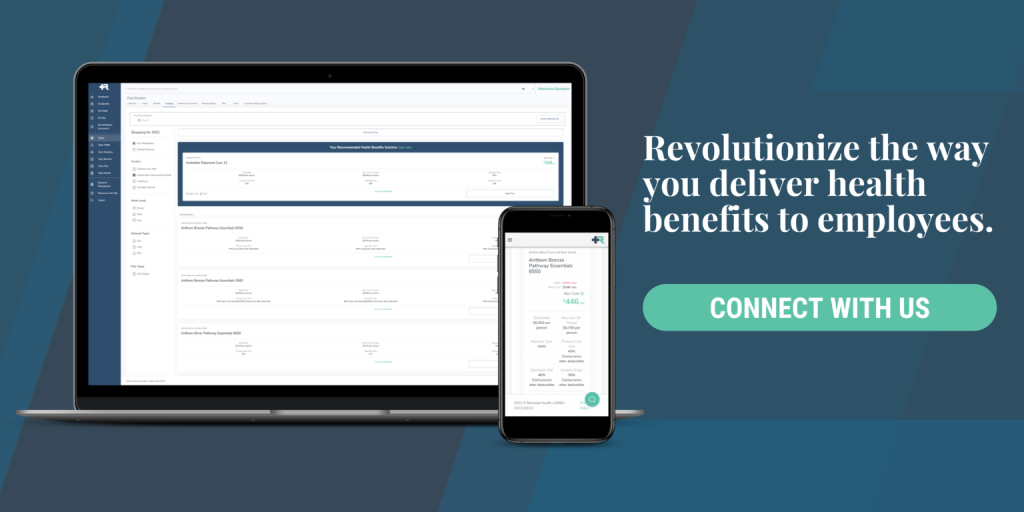How ERISA affects ICHRA (A Comprehensive Guide)
By Mallory Meyer on Nov 11, 2024 10:21:00 AM

Understanding how ICHRA and ERISA work together is essential for employers looking to provide flexible health benefits while staying compliant. ERISA establishes clear standards for managing employee benefits, ensuring transparency and fairness for every plan participant.
But how does this apply to Individual Coverage HRAs?
Employers offering ICHRAs under ERISA must adhere to specific requirements. These rules are there to protect employees and help businesses maintain trust and compliance.
Additionally, ERISA guidelines ensure that ICHRA plans meet minimum value standards, allowing employees to access meaningful and reliable coverage.
In this guide, we’ll break down the essentials of ERISA compliance for ICHRAs, helping employers navigate the process with confidence. Whether you’re new to ICHRA or seeking to refine your current approach, this comprehensive guide has you covered.
Let’s get started!
Understanding ERISA (Employee Retirement Income Security Act)
The Employee Retirement Income Security Act (ERISA) was enacted in 1974 to establish standards for employer-sponsored benefit plans. Its primary goal is to protect employees by ensuring transparency, fairness, and accountability in the administration of these plans. ERISA applies to a variety of benefits, including health insurance, retirement plans, and disability coverage.
ERISA sets clear guidelines for the funding and payment process, ensuring that plans are managed responsibly. Employers must adhere to reporting and disclosure requirements, providing employees with critical information about their benefits. Additionally, ERISA enforces fiduciary responsibilities, mandating that plan administrators act in the best interests of participants.
ERISA’s Scope and Limitations
ERISA covers most private-sector employee benefit plans, including employer-sponsored health plans and Individual Coverage Health Reimbursement Arrangements (ICHRAs). However, certain plans are exempt. For example, government and church-sponsored benefit plans typically fall outside ERISA’s jurisdiction.
While ERISA offers robust protections, its limitations emphasize the importance of understanding which employee benefits are covered. Employers should ensure compliance to deliver the best possible support for their teams.
Understanding ICHRA (Individual Coverage Health Reimbursement Arrangement)
ICHRA is a modern approach to employer-sponsored health benefits. It allows employers to reimburse employees for individual health insurance plans rather than providing a one-size-fits-all group policy. This flexibility makes ICHRA an attractive alternative to traditional group health plans.
Key Features of ICHRA
- Customizable Reimbursement: Employers set monthly limits for reimbursements.
- Employee Choice: Employees can select plans tailored to their circumstances.
- No Employer Premiums: Employers don’t pay premiums for a group plan.
- Tax-Free Benefits: Reimbursements are tax-free for employees and employers.
Eligibility Criteria
Employers of any size can offer ICHRA, including small businesses and large organizations. Employees must purchase individual health insurance plans to qualify for reimbursements. Additionally, plan participants cannot be offered both ICHRA and a traditional group health plan simultaneously. These guidelines ensure flexibility while maintaining compliance.
Read More | An Instructional Blog on ICHRA for Dummies
How ERISA Applies to ICHRA
ICHRA qualifies as a group health plan under ERISA because it involves employer contributions to help eligible employees obtain individual health insurance coverage. As such, ICHRA must adhere to ERISA’s standards for plan administration, ensuring transparency and protection for plan participants.
What does this mean for employers? They are responsible for ensuring that their ICHRA offerings meet ERISA’s requirements, including compliance with fiduciary duties and proper disclosure of benefits.
ERISA’s Impact on Plan Documentation
Under ERISA, employers must provide clear documentation for their ICHRA plans. This includes the Summary Plan Description (SPD) that outlines the benefits, eligibility criteria, and procedures for accessing minimum essential coverage. Additionally, benefits statements should be issued to keep employees informed about their reimbursements and plan details.
These documents not only promote transparency but also help employees better understand their ICHRA benefits. Proper documentation ensures compliance and enhances trust between employers and their teams.
Fiduciary Responsibilities Under ERISA for ICHRA Plans
Employers managing ICHRA plans under ERISA are fiduciaries, meaning they must act in the best interests of employees newly enrolled and current participants. This includes ensuring the plan is administered fairly and contributions are used appropriately.
To fulfill these responsibilities, employers should adopt the following best practices:
- Regularly review and update plan terms to meet ERISA and IRS guidelines.
- Monitor reimbursement processes to ensure fairness and accuracy.
- Offer clear training and resources to help employees understand their ICHRA benefits.
Preventing conflicts of interest is also crucial. Employers should avoid situations where decisions could unfairly favor related parties. For instance, partnering with a neutral third-party administrator can help maintain impartiality in plan management. By focusing on these actionable strategies, employers can uphold their fiduciary duties effectively, fostering trust and confidence among their employees.
ERISA Compliance Requirements for ICHRA
Plan sponsors must provide participants with an SPD outlining benefits, eligibility criteria, and administrative procedures. Employers are also responsible for meeting reporting requirements, such as filing Form 5500 when applicable.
ERISA’s claims procedures and appeals rules ensure fairness in how ICHRA reimbursements are handled. Participants must be informed of their right to appeal denied claims, and plan sponsors must follow clear, consistent processes for resolving disputes.
Employers must also notify participants promptly of any changes to ICHRA benefits. For example, if reimbursement limits increase, clear communication ensures employees can take full advantage of the updates. Transparent and timely notifications are key to maintaining compliance and fostering employee confidence.
Advantages and Challenges of Offering ICHRA Under ERISA
Offering ICHRA under ERISA provides employers with clear financial and operational advantages. Contributions to an employee benefit plan, including ICHRA, are often tax-free, reducing overall payroll costs. For smaller businesses, this can free up resources for other priorities, like expanding operations or enhancing employee wellness initiatives.
Another key advantage is the customization ICHRA offers. Employers can set reimbursement limits that align with their budget, providing flexibility without committing to the rigid costs of traditional group plans. This makes ICHRA a scalable solution for businesses in growth phases or with varying workforce needs.
However, managing an ERISA-compliant ICHRA also comes with challenges. Legal liabilities, such as failure to meet reporting or documentation standards, can lead to penalties. Employers must also balance the administrative burden of compliance, including tracking reimbursements and updating plan details.
Balancing costs and benefits is essential. While compliance requires careful management, the long-term gains in employee satisfaction and cost efficiency often make the effort worthwhile.
Read more about Integrating ICHRA and Medicare!
Special Considerations for Small Businesses
Small businesses often face unique challenges when managing employee benefit plans, but ERISA provides helpful exemptions tailored to their needs. For example, businesses with fewer than 100 participants may be exempt from filing detailed annual reports, such as Form 5500. This reduces administrative complexity while still ensuring compliance with key regulations.
Another advantage for small employers is the flexibility to structure ICHRAs to fit limited resources. Employers can define reimbursement limits based on their budget, making it possible to offer meaningful benefits without overextending financially. This flexibility is especially valuable for businesses with fluctuating revenues or seasonal workforces.
When weighing ICHRA as an option, small businesses should consider how these exemptions and flexible options align with their goals. By leveraging these benefits, smaller employers can provide competitive health benefits while maintaining compliance without the heavy administrative burden often associated with traditional plans.
Learn more about how Remodel Health’s ICHRA+® can benefit your organization
Legal and Regulatory Updates Impacting ERISA and ICHRA
Recent changes in ERISA regulations have clarified the application of ERISA to ICHRA plans. Government guidance has emphasized the importance of ensuring compliance with standards for transparency, reporting, and the handling of protected health information. These updates aim to help employers better understand their obligations under ERISA while maintaining the integrity of employee benefits.
Federal mandates continue to shape ICHRA and ERISA compliance. Potential regulatory adjustments, such as stricter rules on documentation and reporting, could affect how plan sponsors manage their responsibilities. Staying informed about updates to ERISA regulations is critical for employers to maintain compliance and protect plan participants.
Employers offering ICHRA under ERISA must remain proactive. Regularly reviewing legal updates and seeking expert guidance ensures that their plans align with current requirements while continuing to provide robust, compliant health benefits to employees.
Simplifying ERISA Compliance for ICHRA Eligibility and Benefits
Managing ICHRA under ERISA offers employers a cost-effective alternative to traditional benefits. It allows businesses to customize plans while maintaining compliance and transparency. For many, it’s a solution that aligns with both financial goals and employee organization needs.
Understanding ERISA’s requirements is key to leveraging ICHRA effectively. Clear documentation, transparent communication, and proactive compliance help ensure that employees receive the benefits they deserve. Employers can also simplify their efforts by seeking expert guidance.
Evaluating ICHRA eligibility and balancing administrative efforts with the potential rewards is essential. While ERISA compliance may require added effort, the long-term benefits in employee satisfaction and financial feasibility make it worthwhile.
Explore how Remodel Health can support your organization in building an ERISA-compliant, flexible health benefits solution that meets your unique needs. We provide expert guidance and tailored solutions to make managing ICHRA eligibility and compliance simple and effective.
Get started with Remodel Health today.
Check out more resources
See these related articles

ICHRA vs. group health plans
Weighing ICHRA vs. group plans? Compare these health benefit options to understand differences in cost, flexibility, compliance, and employee experience.

Carriers are investing in ICHRA-specific and specialized health plans
Carriers are building ICHRA-specific plans to meet rising demand. Explore how these tailored health plans improve access, pricing, and employee choice.

What are the best states for ICHRA in 2026?
Offering ICHRA for the first time? This guide walks employers through setup, compliance, and employee communication for a smooth first-year rollout.

